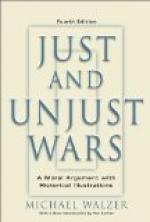Marshall had sought to prepare himself against the time when this very question should be asked him, but the color left his cheeks.
“I don’t think I know what you mean,” he said slowly.
His father made an impatient gesture.
“Don’t tell me that! What has become of Montgomery? Look at me! Two nights ago he came to see me; I had sent for him; I had learned from Nellie that he had practically deserted her. I learned further from the man himself that you and Gilmore were largely responsible for this.”
“He was drunk, of course.”
“He had been drinking—yes—”
“Doesn’t that explain his remarkable statement? What reason could Andy or any one have for wishing to keep him from his wife?” asked Marshall who had recovered his accustomed steadiness.
“He was ready with an answer for that question when I asked it. Do you wish to know what that answer was?” said the judge.
Marshall did not trust himself to speak; he felt the judge’s eyes on him and could not meet them. He saw himself cowering there in his chair with his guilt stamped large on every feature. His throat was dry and his lips were parched, he did not know whether he could speak. His shoulders drooped and his chin rested on his breast. What was the use—was it worth the struggle? Suppose Montgomery, in spite of his promises, came back to Mount Hope, suppose Gilmore’s iron nerve failed him!
“You don’t answer me, Marshall,” said the judge.
“I don’t understand you—” evaded Marshall.
“From my soul I wish I could believe you!” exclaimed his father. “If it’s not debt, what is the nature of your discreditable connection with Gilmore?”
Marshall glanced up quickly; he seemed to breathe again; perhaps after all Montgomery had said less than he supposed him to have said!
“I have already told you that I owe Gilmore nothing!”
“I should be glad to think it, but I warn you to stand clear of him and his concerns, for I am going to investigate the truth of Montgomery’s story,” declared the judge.
“What did he tell you?” Marshall spoke with an effort.
“That his evidence in the North case was false, that it was inspired by Gilmore.”
Marshall passed a shaking hand across his face.
“Nonsense!” he said.
“His story will be worth looking into. He stood for the truth of what he said in part, he insisted that he saw a man cross McBride’s shed on the night of the murder and drop into the alley, and the man was not John North. He seemed unwilling that North, through any instrumentality of his, should suffer for a crime of which he was innocent; his feeling on this point was unfeigned and unmistakable.”
There was silence again, while the two men stared at each other. From the parlor the jarring sound of the music reached them, inconceivably out of harmony with the seriousness of their mood.




